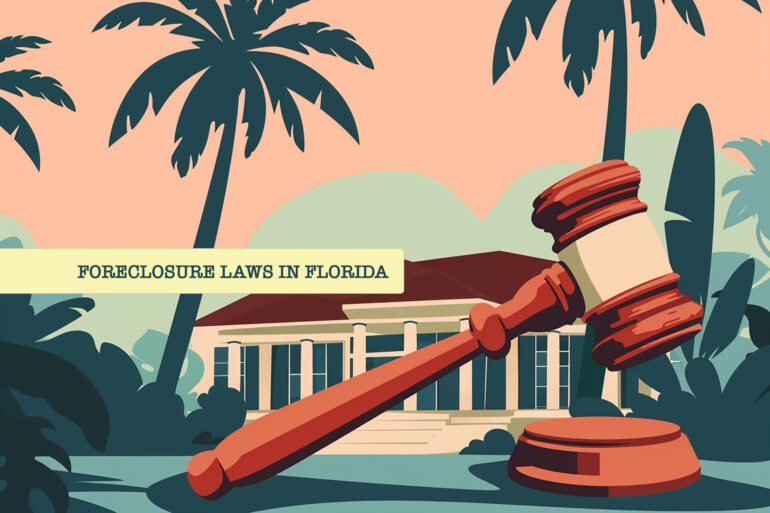Understanding Foreclosure Laws in Florida for Real Estate Investors
Understanding the nuances of foreclosure laws in Florida may be a good idea for homeowners, but it’s crucial for real estate investors looking to make informed decisions. These laws not only dictate how foreclosures can occur but also significantly influence property values and investment opportunities. Whether you’re eyeing a property for its potential value after flipping or considering long-term rental income, how foreclosures are handled can mean the difference between a savvy investment and a financial misstep.
Let’s look at what makes Florida’s foreclosure process unique and how knowing the ropes can put you ahead in the real estate investing game.
Foreclosures in Florida
Florida was one of the top states for foreclosure starts (27,427) and overall foreclosure rates (0.37%) in 2023. The metro areas with the highest foreclosure rates are Lakeland, FL (0.56%) and Jacksonville (0.47%). These numbers account for 357,062 foreclosure filings in 2023, including default notices, scheduled auctions, and bank repossessions, a 10% increase over the previous year.
These numbers show that Florida is ripe with opportunities for those paying attention. Of course, you must also do your homework and understand the overall foreclosure process.
Before the gavel hits and a property officially enters foreclosure, a critical period deserves your attention: the 120-day pre-foreclosure notice period.
Understanding Florida’s Judicial Foreclosure Process
Unlike some states, where a lender can foreclose on a property without stepping into a courtroom, Florida insists on a judicial approach. That means any lender aiming to foreclose on a property must file a lawsuit and obtain a court’s approval to proceed. This process gives property owners a fair shot at contesting foreclosures while opening a transparent system for investors to understand and navigate.
While there are various types of foreclosures in Florida, the most common types include:
- Residential Foreclosures: These involve single-family homes, condos, and other residential properties. These foreclosures follow the standard process.
- Commercial Foreclosures: These involve commercial properties (office buildings, retail spaces, and industrial complexes, etc.). The process is relatively the same as a residential foreclosure, although there are a few more remedies for the lender under the commercial loan agreement.
- HOA Foreclosure: In Florida, homeowner’s associations can foreclose on a property if the homeowner doesn’t pay their dues. The process is mostly the same as a residential foreclosure.
- Tax Deed Sales: Florida law allows the sale of tax deeds to recover unpaid property taxes and other fees. A tax deed sale is similar to foreclosure auctions, but it is run by the county tax collector instead of a court-appointed auctioneer.
Foreclosures can get complex, and the requirement for a lawsuit adds layers of legal proceedings to the mix. For investors, this means keeping an eye on public records and legal filings, which can reveal potential opportunities early in the foreclosure process. On the flip side, Florida has its exceptions, including the rare instances where a “power of sale” clause is part of the mortgage contract, which can streamline the foreclosure process outside of court, offering a quicker path for investors to acquire properties, though this is less common.
Navigating the Pre-Foreclosure Period: Opportunities for Investors
Before the gavel hits and a property officially enters foreclosure, a critical period deserves your attention: the 120-day pre-foreclosure notice period. This window lets homeowners square away their debts or work out alternatives like loan modifications or short sales. For the astute investor, this period is gold — it’s your cue to identify and act on potential investment gems before they’re scooped up at auction.
Engaging with homeowners or lenders during this time can be beneficial. That’s when everything is about timing and negotiation, offering solutions that can help both parties. Here’s where PropertyOnion comes into play. With tools designed to track these pre-foreclosure notices, investors can stay ahead of the curve, identifying opportunities the moment they arise and acting swiftly to secure potential deals.
Keep in mind that it’s not just about finding these opportunities; it’s about understanding them inside and out.
The Right to Redemption: A Window of Opportunity
In Florida, once a property has been sold at a foreclosure auction, the original homeowner has a brief but critical window to reclaim their property — this is known as the right of redemption. Specifically, they have up to 10 days post-sale to pay off the total amount of the winning bid. For investors, this period is a time of anticipation. It offers a chance to finalize acquisition plans but also requires readiness to pivot if the original owner steps in to redeem.
The significance of this 10-day window cannot be understated. It’s a tightrope walk where anything can happen, and being prepared is vital. For those looking to acquire properties, this means having financing lined up and a clear plan for the property’s future. However, the likelihood of a homeowner redeeming their property is often low, especially in cases where the foreclosure resulted from significant financial distress. This reality creates a ripe environment for investors to enter the post-redemption period, ready to turn these properties around.
The Importance of Legal Guidance
Navigating Florida’s maze of foreclosure laws is no small feat. It requires a keen understanding of legal proceedings, a strategic investment approach, and, often, the insight of a seasoned foreclosure attorney. These professionals can offer invaluable guidance through the complexities of judicial foreclosures, redemption rights, and deficiency judgments, ensuring investors can confidently make informed decisions.
Understanding Florida’s foreclosure laws and having access to the right tools are pivotal for real estate investment success.
Leveraging PropertyOnion’s Tools for Foreclosure Investments
When it comes to understanding the foreclosure market in Florida, having the right tools can make all the difference. PropertyOnion’s comprehensive database and resources are designed to give investors the upper hand, helping them spot and act on foreclosure opportunities with precision and confidence.
Keep in mind that it’s not just about finding these opportunities; it’s about understanding them inside and out. PropertyOnion offers robust due diligence tools, including detailed title searches and insights into potential investments. That means you get a complete picture of what you’re stepping into. Whether you need to understand any liens against the property or navigate the intricacies of Florida’s foreclosure laws, we’ve got you covered. We even offer 1-on-1 training on foreclosure auctions to ensure you get the most from your investment.
Empowering Investors with Knowledge and Tools
The bottom line is that understanding Florida’s foreclosure laws and having access to the right tools are pivotal for real estate investment success. You want to make smart, strategic moves that set you apart in the competitive real estate market.
At PropertyOnion, we’re committed to empowering investors like you. Our platform is designed to keep you informed, equipped, and ready to seize investment opportunities with both hands. With our comprehensive database, due diligence tools, and connection to other resources, you have everything you need to navigate the complexities of the foreclosure market in Florida confidently.
So, whether you’re a seasoned investor or just starting, remember that knowledge is power, and the right tools can turn opportunities into successes. Let PropertyOnion be your guide to mastering the art of foreclosure investments in Florida. Here’s to making every investment a steppingstone to your real estate investment goals.








